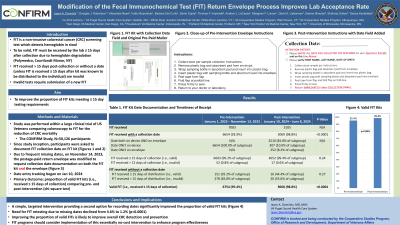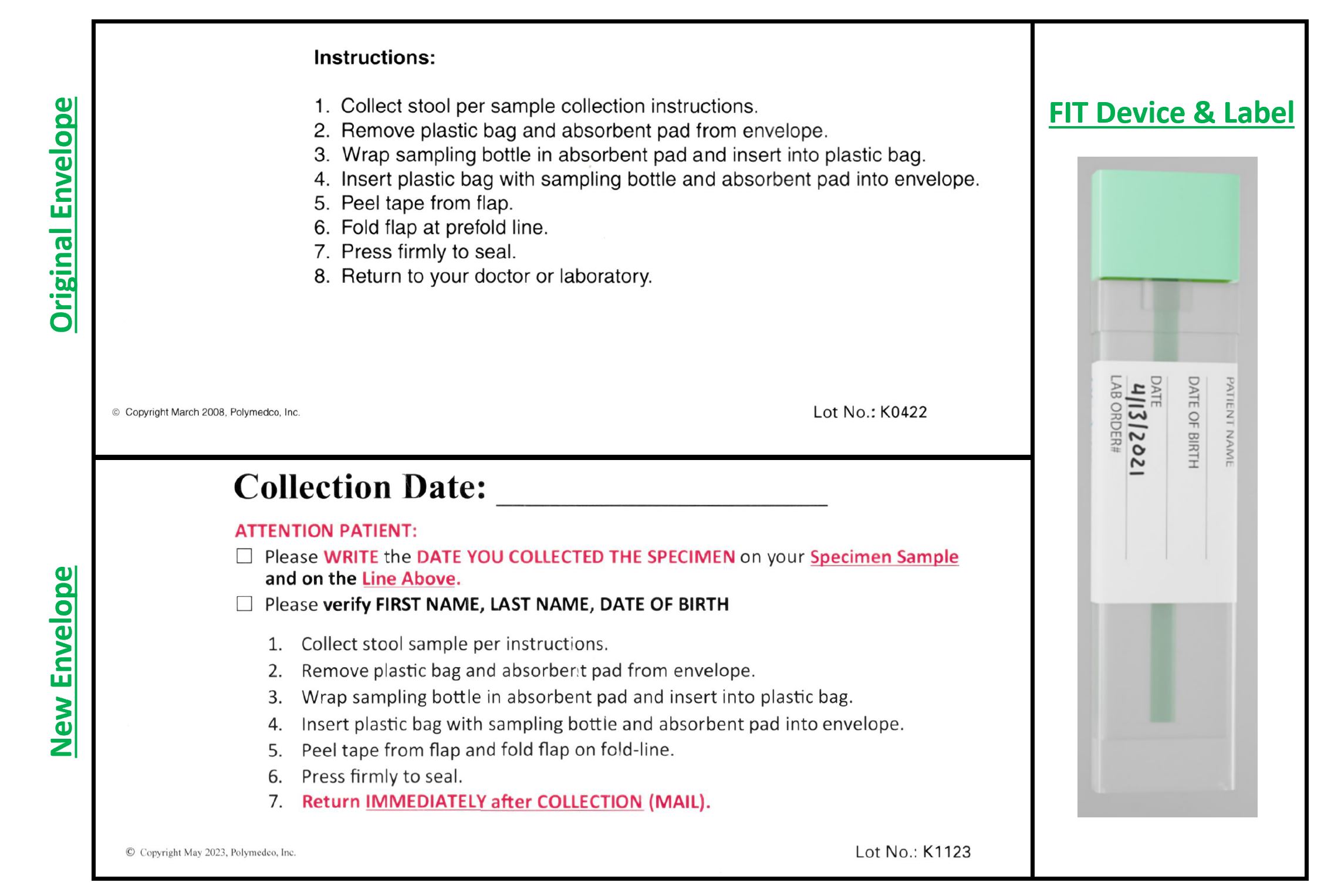Monday Poster Session
Category: Colorectal Cancer Prevention
P2149 - Modification of the Fecal Immunochemical Test (FIT) Return Envelope Process Improves Lab Acceptance Rate
Monday, October 28, 2024
10:30 AM - 4:00 PM ET
Location: Exhibit Hall E

Has Audio

Jason A. Dominitz, MD, MHS
Veterans Health Administration
Bellevue, WA
Presenting Author(s)
Award: Presidential Poster Award
Jason A. Dominitz, MD, MHS1, Douglas Robertson, MD, MPH2, Alexander Beed, MS3, Kathy D.. Boardman, MS4, Barbara J.. Del Curto, BS5, Samir Gupta, MD6, Thomas Imperiale, MD7, Andrew J. LaCasse, MPH8, Meaghan F. Larson, MPH9, David Lieberman, MD10, Aasma Shaukat, MD, MPH11, Shahnaz Sultan, MD12, Tassos Kyriakides, PhD3
1Veterans Health Administration, Bellevue, WA; 2White River Junction, VA Medical Center, White River Junction, VT; 3Cooperative Studies Program, West Haven, CT; 4VA CSPCRPCC, Albuquerque, NM; 5VA Cooperative Studies Program, Albuquerque, NM; 6VA San Diego/UC San Diego, San Diego, CA; 7Indiana University, Indianapolis, IN; 8White River Junction VA Medical Center, Canaan, NH; 9VA Puget Sound Health Care System, Seattle, WA; 10Oregon Health & Science University, Portland, OR; 11NYU, New York, NY; 12University of Minnesota and Minneapolis VA Health Care System, Minneapolis, MN
Introduction: FIT is a non-invasive colorectal cancer screening test predicated on hemoglobin detection in stool. Per the manufacturer (Polymedco, Courtlandt Manor, NY), analysis ≤15 days after collection is required due to hemoglobin degradation. Specimens received >15 days post-collection or without a date are technically invalid (unless documentation of dispensing of the kit < 15 days prior is available). Our aim was to improve the proportion of FIT kits meeting testing requirements.
Methods: This study was performed within a large clinical trial of US Veterans (N=50,126) comparing colonoscopy to FIT for the reduction of colorectal cancer mortality. The postage paid return envelope was modified to request documentation of the sample collection date on both the kit and the envelope itself beginning on Nov 14, 2023 (Figure). Formal tracking of date location(s) began on 1/10/2024. The proportion of kits received 1) with a collection date and 2) within 15 days of collection was compared between pre- and post-intervention with the chi-square test.
Results: Pre-intervention, 6654/7083 FIT kits (93.9%) arrived at the lab with a collection date compared to 3069/3105 (98.8%) post-intervention (p< 0.001, Table). Post-intervention, the date was only available on the envelope in 252 cases (8.2% of dated kits). No kits were received with discordant dates between the device and envelope. Over 99% of FIT kits with dates were received ≤15 days of collection in both study phases (p=0.24). Pre-intervention, 35.2% of kits without a date were received ≤15 days of original outbound mailing of the kit to the Veteran, thereby allowing testing in 95.4% of all kits received. Post-intervention, 44.4% of undated kits were received ≤15 days of mailing from the VA, allowing for testing of 98.8% of all kits (p< 0.001 compared to pre-intervention). The intervention increased testable kits by 3.5% (95% CI, 2.8, 4.1).
Discussion: A simple, targeted intervention providing a second option for recording sample collection dates significantly improved the lab’s ability to process FIT and significantly reduced the proportion of individuals requiring retesting (from 4.6% to 1.2%). This is likely to improve overall cancer detection. Programs using FIT should consider implementation of this intervention to enhance program effectiveness.

Note: The table for this abstract can be viewed in the ePoster Gallery section of the ACG 2024 ePoster Site or in The American Journal of Gastroenterology's abstract supplement issue, both of which will be available starting October 27, 2024.
Disclosures:
Jason A. Dominitz, MD, MHS1, Douglas Robertson, MD, MPH2, Alexander Beed, MS3, Kathy D.. Boardman, MS4, Barbara J.. Del Curto, BS5, Samir Gupta, MD6, Thomas Imperiale, MD7, Andrew J. LaCasse, MPH8, Meaghan F. Larson, MPH9, David Lieberman, MD10, Aasma Shaukat, MD, MPH11, Shahnaz Sultan, MD12, Tassos Kyriakides, PhD3. P2149 - Modification of the Fecal Immunochemical Test (FIT) Return Envelope Process Improves Lab Acceptance Rate, ACG 2024 Annual Scientific Meeting Abstracts. Philadelphia, PA: American College of Gastroenterology.
Jason A. Dominitz, MD, MHS1, Douglas Robertson, MD, MPH2, Alexander Beed, MS3, Kathy D.. Boardman, MS4, Barbara J.. Del Curto, BS5, Samir Gupta, MD6, Thomas Imperiale, MD7, Andrew J. LaCasse, MPH8, Meaghan F. Larson, MPH9, David Lieberman, MD10, Aasma Shaukat, MD, MPH11, Shahnaz Sultan, MD12, Tassos Kyriakides, PhD3
1Veterans Health Administration, Bellevue, WA; 2White River Junction, VA Medical Center, White River Junction, VT; 3Cooperative Studies Program, West Haven, CT; 4VA CSPCRPCC, Albuquerque, NM; 5VA Cooperative Studies Program, Albuquerque, NM; 6VA San Diego/UC San Diego, San Diego, CA; 7Indiana University, Indianapolis, IN; 8White River Junction VA Medical Center, Canaan, NH; 9VA Puget Sound Health Care System, Seattle, WA; 10Oregon Health & Science University, Portland, OR; 11NYU, New York, NY; 12University of Minnesota and Minneapolis VA Health Care System, Minneapolis, MN
Introduction: FIT is a non-invasive colorectal cancer screening test predicated on hemoglobin detection in stool. Per the manufacturer (Polymedco, Courtlandt Manor, NY), analysis ≤15 days after collection is required due to hemoglobin degradation. Specimens received >15 days post-collection or without a date are technically invalid (unless documentation of dispensing of the kit < 15 days prior is available). Our aim was to improve the proportion of FIT kits meeting testing requirements.
Methods: This study was performed within a large clinical trial of US Veterans (N=50,126) comparing colonoscopy to FIT for the reduction of colorectal cancer mortality. The postage paid return envelope was modified to request documentation of the sample collection date on both the kit and the envelope itself beginning on Nov 14, 2023 (Figure). Formal tracking of date location(s) began on 1/10/2024. The proportion of kits received 1) with a collection date and 2) within 15 days of collection was compared between pre- and post-intervention with the chi-square test.
Results: Pre-intervention, 6654/7083 FIT kits (93.9%) arrived at the lab with a collection date compared to 3069/3105 (98.8%) post-intervention (p< 0.001, Table). Post-intervention, the date was only available on the envelope in 252 cases (8.2% of dated kits). No kits were received with discordant dates between the device and envelope. Over 99% of FIT kits with dates were received ≤15 days of collection in both study phases (p=0.24). Pre-intervention, 35.2% of kits without a date were received ≤15 days of original outbound mailing of the kit to the Veteran, thereby allowing testing in 95.4% of all kits received. Post-intervention, 44.4% of undated kits were received ≤15 days of mailing from the VA, allowing for testing of 98.8% of all kits (p< 0.001 compared to pre-intervention). The intervention increased testable kits by 3.5% (95% CI, 2.8, 4.1).
Discussion: A simple, targeted intervention providing a second option for recording sample collection dates significantly improved the lab’s ability to process FIT and significantly reduced the proportion of individuals requiring retesting (from 4.6% to 1.2%). This is likely to improve overall cancer detection. Programs using FIT should consider implementation of this intervention to enhance program effectiveness.

Figure: Return envelope (pre- & post- addition of a date field) and FIT collection device with standard date field
Note: The table for this abstract can be viewed in the ePoster Gallery section of the ACG 2024 ePoster Site or in The American Journal of Gastroenterology's abstract supplement issue, both of which will be available starting October 27, 2024.
Disclosures:
Jason Dominitz indicated no relevant financial relationships.
Douglas Robertson: Topography – Consultant.
Alexander Beed indicated no relevant financial relationships.
Kathy Boardman indicated no relevant financial relationships.
Barbara Del Curto indicated no relevant financial relationships.
Samir Gupta: CellMax LLC – Consultant, Stock Options. Geneoscopy – Consultant. Guardant Health – Consultant. InterVenn Biosciences – Consultant. Universal Diagnostics – Consultant.
Thomas Imperiale indicated no relevant financial relationships.
Andrew LaCasse indicated no relevant financial relationships.
Meaghan Larson indicated no relevant financial relationships.
David Lieberman: Colowrap – Advisory Committee/Board Member. Geneoscopy – Advisory Committee/Board Member. UDX – Advisory Committee/Board Member.
Aasma Shaukat indicated no relevant financial relationships.
Shahnaz Sultan indicated no relevant financial relationships.
Tassos Kyriakides indicated no relevant financial relationships.
Jason A. Dominitz, MD, MHS1, Douglas Robertson, MD, MPH2, Alexander Beed, MS3, Kathy D.. Boardman, MS4, Barbara J.. Del Curto, BS5, Samir Gupta, MD6, Thomas Imperiale, MD7, Andrew J. LaCasse, MPH8, Meaghan F. Larson, MPH9, David Lieberman, MD10, Aasma Shaukat, MD, MPH11, Shahnaz Sultan, MD12, Tassos Kyriakides, PhD3. P2149 - Modification of the Fecal Immunochemical Test (FIT) Return Envelope Process Improves Lab Acceptance Rate, ACG 2024 Annual Scientific Meeting Abstracts. Philadelphia, PA: American College of Gastroenterology.

